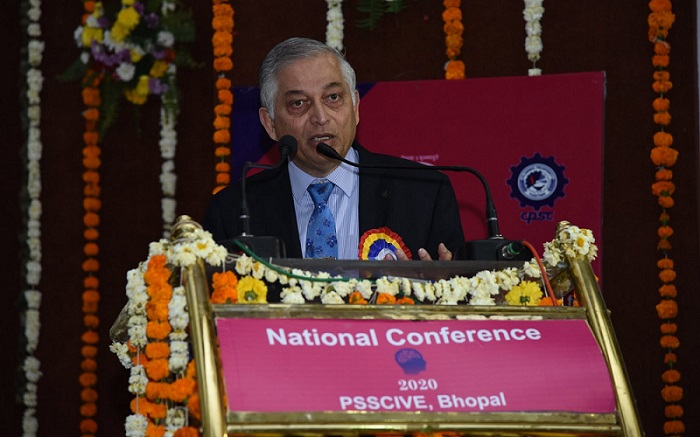“The world is changing. And it is changing the way we work and live” – Dr. Shyamal Majumdar, Former Head, UNESCO-UNEVOC International Center, Bonn, Germany. Right from fishing, farming, healthcare, automotive and service sector, everywhere, technical skill is becoming very important. Dr. Shyamal Majumdar spoke about the major trends impacting the future of jobs and a new vision for TVET in the 21st Century at PSSCIVE National Conference on reimagining TVET 2020.
3 factors contributing to the changing nature of work:
- Technological and Digital Innovation:
It is changing from divergent technology to convergent technology. For example, Mechatronics. If one wants to be a good Mechatronics Engineer, he/she has to be good at not only Mechanical Engineering but also Electrical.
- Green Economy:
Fossil based economy is changing to the renewable and alternative economy. 50 years from now, many countries will shift to electric vehicles. Our students must be prepared for not only the present technology but also the future one.
- Development focus:
The developmental focus of the world is changing from traditional to sustainable development.
 While previous Industrial Revolutions have created a space for newer technology and innovation, the 4th Industrial Revolution has given a push to this. The 4th Industrial Revolution or Industry 4.0 is Cyber-Physical Systems. Cyber-Physical Systems is the Internet of Things (IoT), Additive Manufacturing, Artificial Intelligence, Big data, Cloud Computing, Augmented Reality, Simulation, and Modelling. All this has created a disruption in life. But every innovation creates a disruption before the transformation.
While previous Industrial Revolutions have created a space for newer technology and innovation, the 4th Industrial Revolution has given a push to this. The 4th Industrial Revolution or Industry 4.0 is Cyber-Physical Systems. Cyber-Physical Systems is the Internet of Things (IoT), Additive Manufacturing, Artificial Intelligence, Big data, Cloud Computing, Augmented Reality, Simulation, and Modelling. All this has created a disruption in life. But every innovation creates a disruption before the transformation.
Innovation – Disruption – Transformation:
- The disruption is not just because of technological innovation but also social innovation.
- Over 50% growth from innovation depends on skills
- Overall huge skills shortage – both in a digital and green economy
- Entrepreneurship is the fastest-growing skill in-demand – up by 30% by 2030
- Digitization is changing skills in 30% of jobs
Common Characteristics of future jobs are that they are:
- Interdisciplinary
- Oriented to Research and Development
- Information-intensive
- Have shorter life-cycle
In these changing times of the nature of work, mere occupational skill is not enough to sustain it. We will need a foundation and transferable skills along with occupational skills. Youth will domain-independent skills like interpersonal skills, cognitive skills, adaptability, and other 21st century skills along with the right attitude, values and work habits. Based on the new skillsets needed, Technical and Vocational Education and the Training (TVET) system in India must be reviewed and transformed.
TVET system must be reviewed under the following lens:
- Economic lens: Any TVET system must be labor market-sensitive. Demand and supply must be harmonized. Therefore, the TVET system must be efficient, responsive, attractive, and accountable.
- Equity lens: Any growth must be equally distributed so that some people are not left beyond the development orbit. Therefore, the TVET system should also ensure inclusivity and access in terms of delivery. It should have quality and equity and look after the well-being of the people of this nation.
- Transformative lens: The TVET system should be innovative, sustainable, life-long, have quality. Because, TVET is not just for the present but also for the future.
Major dimensions of transformation in the TVET:
- Inclusive TVET: Access and inclusivity
- Quality TVET: Focus on learning outcome and quality assurance
- Lifelong learning: school to work and work to school path
- Greening TVET: developing skills for green jobs and green society
- Innovative TVET: introducing entrepreneurial, leadership and other organizational practices in schools
Dr. Shyamal Majumdar touched upon several aspects of the era of convergence. The convergence of technology, a convergence of academics and vocational, of school to work and work to school and also upon the converging planet and people for sustainable development. He greatly emphasized the need for TVET transformation, which is lead by innovation. Innovation must become a dominant feature of the institution, where it characterizes its culture, nature of its partners, skills and capabilities of its students and adult learners.













Comments 1